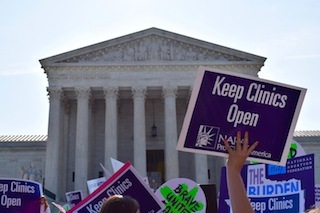Lack of abortion access creates economic hardships for women

Women who are denied abortions can suffer economic hardships that last for years, according to a new study.
Published last month in the American Journal of Public Health, the research paper Socioeconomic Outcomes of Women Who Receive and Women Who Are Denied Wanted Abortions in the United States found that women who were denied abortions were more likely than women who got abortions to be marginally employed, unemployed, or on public assistance for months and even years afterwards.
The report comes during a period when access to abortion has been steadily shrinking; state legislatures have passed more than 300 restrictions on abortion since 2010.
“Often when abortion is in the news, it’s covered as an abstract policy thing or a political thing. You almost find no women in the actual news article,” said Diana Greene Foster, a University of California at San Francisco professor, director of research for UCSF’s Advancing New Standards in Reproductive Health project, and the study’s lead author. “But this is not just about politics. It’s about what happens to women when they cannot get access to an abortion.”
She told the Women’s Media Center, “We don’t know for sure whether some of the women who were denied abortions chose to stay home [afterward] or whether they voluntarily left or were forced out of a job. And not ‘forced’ as in being fired, but as in ‘We can’t give you enough work hours ... ’ ”
The new study is the latest of more than two dozen research papers based on the reproductive health project’s Turnaway Study. The UCSF researchers enrolled 813 women from 30 clinics across the United States where they attempted to get abortions. The women were not able to undergo the procedure were turned away for reasons including being too far along in their pregnancy to legally abort or lacking the funds to do so. Roughly half of the women lived at or below the federal poverty line when they sought an abortion; 63 percent already were mothers; and 76 percent said they didn’t have enough to cover food, transportation, and housing costs.
The six-person Turnaway research team conducted twice-yearly telephone interviews — 8,000 in total — of those women for five years that ended in 2015, researchers wrote.
Among their conclusions:
- The odds of being poor six months after getting or being denied an abortion were 3.7 times higher for women who were turned away from clinics than for women who got an abortion.
- The odds of being a recipient of Temporary Assistance for Needy Families, one of several welfare programs, six months afterward were 6.2 times higher for those who were denied than those who got an abortion.
- The odds of having a full-time job six months afterward were .37 times lower for those who were denied than those who got an abortion.
- Four years after getting or being denied an abortion, the denied group remained more likely to be in poverty, on public assistance, underemployed, or jobless.
The research does not suggest that being denied an abortion was the root cause of economic hardship among the women in question who already were living with relatives, already mothers, and sometimes had problematic relationships with their spouses or partners, among other circumstances.
Rather, the researchers wrote, “Laws that restrict access to abortion may result in worsened economic outcomes for women.”
According to the latest information available from the Guttmacher Institute, which tracks reproductive health policy, in 2016, 45 states had laws allowing individual physicians to refuse to perform abortions; and 42 states had laws allowing health care institutions to refuse to do abortions.
Additionally, just 17 of the 50 states use government funds to pay for all or most medically necessary abortions for low-income women on Medicaid. The District of Columbia and 32 states ban the use of most state funds to pay for abortions, except in some cases in which pregnancy endangers a woman’s life or resulted from rape or incest. One state, South Dakota, funds abortions only when continuing a pregnancy could result in a woman’s death.
“The most common reason that women abort is financial,” said Antonia Biggs, a social psychologist who has studied anxiety, depression, post-traumatic stress syndrome, and other mental illneses among women who want to or actually abort. “They have this feeling they cannot afford to pay for the cost of raising a child. And we find a host of other reasons, often related to not being with the right partner or being in an abusive relationship and not wanting to raise a child in that.”
Added lead researcher Greene Foster: “This research got started when an abortion provider said to me that she wondered what happened to women who were turned away from clinics. … What distinguishes those who get turned away from the rest is that many of them didn’t even recognize that they were pregnant. And this can happen to so many people: to the young who are in denial and don’t have regular periods, to a woman who’s just given birth and doesn’t realize she can get pregnant again so soon after that.”
“Most people,” she said, “have no idea that women are ever denied an abortion. They think that since it’s legal, it must be easily available.”
More articles by Category: Health
More articles by Tag: Reproductive rights, Abortion



























